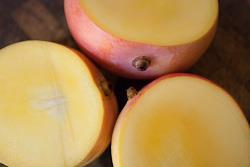
Australia’s mango industry is hoping negotiations for access to the US market will wrap up in time for the 2012/13 season.
The negotiations were initially scheduled to conclude this year, but the discussion ran into a hiccough, according to Peter Delis, chairman of the Australian Mango Industry Association.
“We’re angling for it to be settled before next season, but there are a couple of issues that need to be resolved, and of course these things are rarely in the hands of the exporting country,” he told Fruitnet.com. “Hopefully we’ll get access well in advance of the next season so growers can get ready for export.”
The protocol itself has already been signed off, and involves irradiation treatment to control against fruit fly. A similar protocol has been used by the Australian industry for access to New Zealand since 2004, as well as Malaysia.
“Irradiation’s more of a new thing for horticulture, but we’ve been sending fruit to New Zealand and Malaysia for a while now,” said Mr Delis. “So it’s not really new to us, and nobody in the industry is uninformed about it.”
Australian fruit will probably be airfreighted into the US market, which will put it at a disadvantage against competitors in terms of price, but will mean the fruit will have a high landed quality. Australian mango exporters also have well-developed airfreight logistics through experience in other markets.
“When we’re talking about airfreighting, we’re going to have to compete on something other than price; it has to be on quality and flavour,” said Mr Delis. The short picking to arrival time will mean fruit can be picked at full maturity, giving it a competitive edge against competitors like Mexico.
“American consumers’ exposure is to Florida varieties…our varieties are stronger flavoured, and consumers will be able to differentiate `Australian mangoes` based on that.”
That has been the industry’s experience in the UK market as well, where airfreighted fruit has been well-received and sold at a premium.
The bulk of the Australian mango industry is still in the flowering phase, and while things are looking good so far, flowering is only half the battle, stated Mr Delis.
“Flowering has certainly been better than the last few years, but we’re not selling flowers, we’re selling fruit.”



